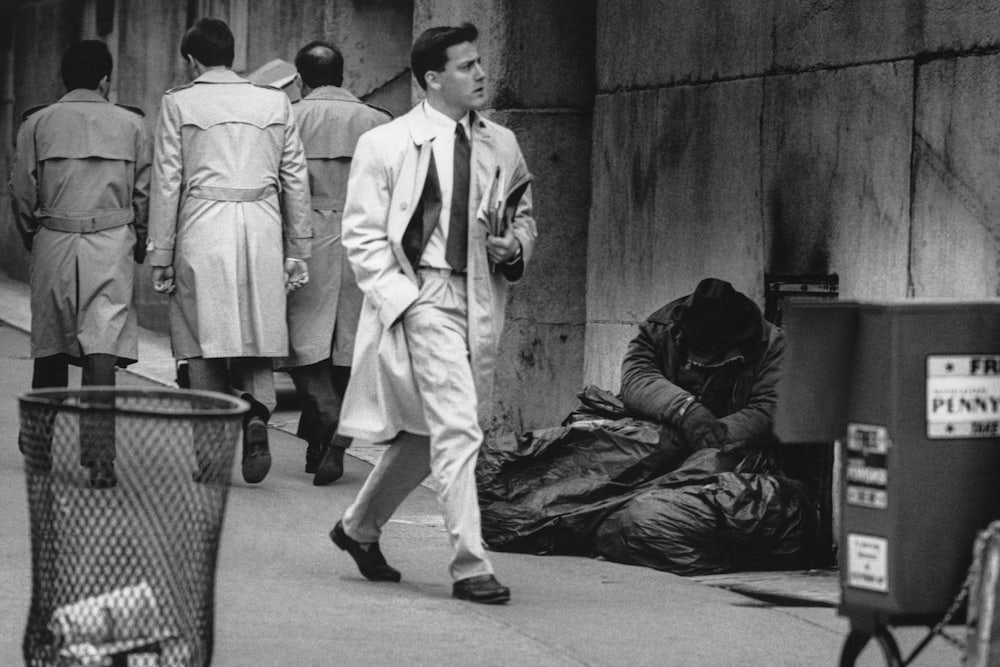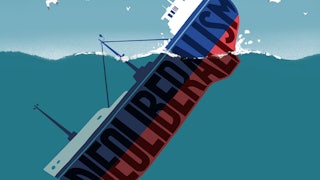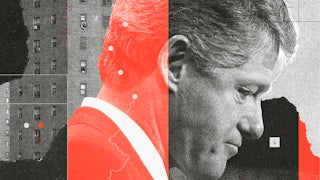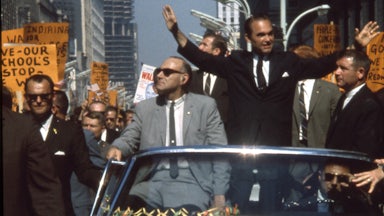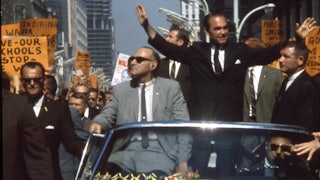Brad DeLong knows a thing or two about the U.S. economy. As one of the world’s leading macroeconomists, a former Treasury Department deputy assistant secretary, and the author of the new book Slouching Towards Utopia: An Economic History of the Twentieth Century, DeLong is an expert on both the history and the theory of neoliberalism. And he’s as surprised as anyone that it came to power so completely and that it’s lasted this long. “In my heart of hearts, I still cannot believe that the New Deal order collapsed as rapidly as it did in the 1970s,” DeLong says.
On episode 9 of How to Save a Country, hosts Felicia Wong and Michael Tomasky talk with DeLong about what came next, and Tomasky exits host mode to talk about his book The Middle Out: The Rise of Progressive Economics and a Return to Shared Prosperity—which, incidentally, was published on the same day as DeLong’s. They discuss what neoliberalism is (always a matter of debate), when and how it became the dominant way of thinking about the economy, and why it’s finally on the way out. (Maybe.) Brad also discusses the ways his generation failed and what the next generation must do to meet the new challenges of the twenty-first century, from the climate crisis to wealth inequality.
How to Save a Country is presented by the Roosevelt Institute, The New Republic, and PRX. Generous funding for this podcast was provided by the William and Flora Hewlett Foundation and Omidyar Network. Views expressed do not necessarily reflect the opinions and beliefs of its funders.
Michael Tomasky: I’m Michael Tomasky, editor of The New Republic.
Felicia Wong: And I’m Felicia Wong, president and CEO of the Roosevelt Institute.
Michael: And this is How to Save a Country, our podcast on the ideas and the people contributing to a new political vision and a new economic vision for the United States. We connect the economy, democracy, and freedom.
Felicia: Because progressives need a common purpose and a common strategy if we’re going to win.
Michael: Yeah, that’s certainly true.
Felicia: So if you’re a loyal listener of our show, you’ve probably heard us throw around the word “neoliberal” a lot.
Amy Kapczynski [clip]: You could call it neoliberal thinking.
Felicia: Let’s start by talking about a specific word here, neoliberalism.
Michael [clip]: This word, neoliberal.
Felicia [clip]: That’s the neoliberal economic worldview.
Michael [clip]: Neoliberalism.
Rhiana Gunn-Wright [clip]: How much different is that than neoliberalism before?
Felicia [clip]: This is how neoliberalism ate away at democracy.
Michael [clip]: These neoliberals, the neoliberal era.
Felicia [clip]: The neoliberal era.
Michael [clip]: The neoliberal period.
Felicia [clip]: The libertarian neoliberal, if you will.
Michael [clip]: Neoliberalism’s values.
Felicia [clip]: Neoliberalism was a way of life.
Michael [clip]: Neoliberalism isn’t dead.
Dorian Warren [clip]: We need to actually put the final nail on a coffin, on the continued, I would say, neoliberal ideology.
Michael: Today we’re going to
throw it around even more.
Felicia: Yeah. We’re going to take a step back to have a more historical and a more theoretical conversation about neoliberalism. Maybe the step back will be welcome after all the politics, politics, politics we’ve been dealing with. We’re going to be talking about neoliberalism itself. What is it? When did it become such a dominant way of thinking about the economy?
Brad DeLong [clip]: In my heart of hearts, I still cannot believe that the New Deal order collapsed as rapidly as it did in the 1970s. It was still delivering enormous productivity growth and real wage increases.
Michael: That was our guest today. He’s one of the most policy-oriented macroeconomists of his generation: Brad DeLong.
Felicia: Yeah, Michael. You’re our other guest today.
Michael: Thank you for having me.
Felicia: Yes. Well, it’s fun to have you on the other side of the mic. The reason we designed it this way, designed this show this way, is that, Michael, both you and Brad published books this fall.
Michael: Incidentally, our books were officially published on exactly the same day, September 6.
Felicia: Michael, your book, The Middle Out, charts how a free-market, conservative, neoliberal view of economics ascended in the 1970s, and then you spend a lot of time on the more progressive economics that are shaping our country today.
Michael: Yeah. Well that part mentions you, and says what an important thing the Roosevelt Institute is.
Felicia: Aw thanks, Michael.
Michael: But yes, I do spend a lot of time on that, and Brad’s book, which is called Slouching Towards Utopia, is a century-plus-long story of how technological advances changed life, changed humanity, seemed to put utopia just within our reach, and yet discusses why we’ve never gotten there.
Felicia: Brad’s book really telescopes. It goes back thousands of years, kind of jump-starts again in the 1870s, and then we spend a lot of time, of course, talking to him about the last 50 or so years. We should get right to it, Michael.
Michael: We should. But first, if you’ve been enjoying these conversations with some of today’s most important political thinkers and doers, please leave us a rating or a review.
Felicia: And also tell your friends; word of mouth matters in podcast land.
Michael: And now, Brad DeLong.
Felicia: First, a few introductions. Michael, our listeners already know about you from the show, but tell us something they might not know about you and go ahead and give us the elevator pitch for your book.
Michael: Sure. Well, the elevator pitch for the book is that it tells a story that I don’t think any other book out there is telling, which is how the movement was built over the last 15 years to push Joe Biden to do the things he’s trying to do. So that’s a ride from the ground floor to about what, like the fifth floor, we can go up to the forty-fifth floor later on.
Felicia: Brad, you’ve got a new book out this fall called Slouching Towards Utopia. Can you describe it and give me the elevator pitch?
Brad DeLong: It’s about how between 1870 and 2010, for the first time in human history and totally unexpectedly, we acquired the technological powers to enable humanity to bake a large enough economic pie so that everyone could have enough. But it’s also about how from 1870 to 2010, the problems of how to properly slice and then also to taste, to enjoy, to use the pie to create a truly human world, how those questions completely flummoxed us.
Felicia: So we have the conditions for utopia, but we do not have a utopia, and that’s what you were writing about.
Brad: Yes.
Felicia: So I have to explain neoliberalism and what’s wrong with it everyday. It’s my job. But I mostly look at it through a political lens because I’m a political scientist from Berkeley, by the way. You’re a macroeconomist. I’d love you to walk me through neoliberalism and what’s wrong with it from the economic perspective.
Brad: Well, let me start with the bad neoliberalism, and in many ways the bad neoliberalism, basically it’s the market giveth, the market taketh away, blessed be the name of the market. That is, it’s the belief that if property rights are cut at the joints properly, the market economy then crowdsources the problem of increasing production and so effectively mobilizes human brain power to making a richer world in a way that no other system can. But I think its most powerful advocate, Friedrich von Hayek, warned accepting what the market gives us to as blessed comes at a horrible price. A market system cannot provide any form of social justice and if you demand that it be tweaked and managed to do so, it would wreck the market’s ability to do what it could, and so this is Margaret Thatcher’s Tina.
Michael: Which stands for “there is no alternative.” This was a slogan associated with Margaret Thatcher and the Conservative Party in Britain, basically saying a free market is the only way.
Brad: Yes. Yes. There is no alternative other than taking the British polity, society, and economy and wrenching them back to one that trusts the market and that accepts whatever the market does as the best attainable end.
Felicia: Would you say, Brad, that whatever the market does, is its best attainable end?
Brad: No, and I would say that that is right neoliberalism and I will also say that there was a left neoliberalism as well, because the same word was used more or less in the 1970s to say that the post–World War II system had become overbureaucratized, too encrusted with rent-seeking groups, with politically strong clients that had weak claims on government programs and support, and that there was a good deal of truth in Von Hayek’s observation that a properly constructed market economy crowdsources the solution to an enormous amounts of human problems, that you’re not having some bureaucrat at the center or some central planner who has next to no information setting out what has to be done. You’re creating a flexible system in which the people on the spot with the information are empowered to act and to act for the common good as long as you can properly tweak things so that individual incentives are to act for the common good. And that good neoliberalism, that left neoliberalism, of which I was once a card-carrying member, was going to be a huge improvement over what had happened in the post–World War II generation.
Felicia: So Brad, just to summarize for listeners who haven’t been living and breathing this for years, like all of us here, left neoliberalism and right neoliberalism can agree on a few things. Both sides can agree that a free market is more efficient. But left neoliberals think that the market needs to be kind of clipped or trimmed to help ordinary people, small tweaks like tax credits. Right neoliberals, which we spend a lot of time talking about here, they just want to let the market rip. The bigger the company, the better, and maybe it’s going to create jobs and trickle down. I think both right and left neoliberals would disagree with people like me or people like Brian Deese because we think today that there’s a place for direct government investment to drive new sectors of the economy and there’s a place for government reigning in monopolies and that’s not neoliberal at all.
Michael, as you hear this, as you hear Brad describe the varieties of neoliberalism, how does that strike you?
Michael: What I hope is interesting in my book is that I discuss the ways that the economics profession, political activism, and the think tank and foundation worlds, of which you, Felicia, are a part too.
Felicia: Card-carrying member.
Michael: Yeah. You are. The way those three forces have worked in recent years to try to get at and attack the foundations of neoliberalism and build a new set of assumptions into the way we, and into the way regular Americans, think about the economy that hasn’t always been done very successfully. For example, I raise this question in my book, the Great Recession, by all rights, should have wiped out neoliberal thought. Why wasn’t neoliberalism dead and buried then in 2009? The answer to me is that our side hadn’t done a good job of formulating an alternative at both the practical level of policies and the somewhat more abstract level of the ideas that drive the policies. And I’m not an economist, so Brad forgive me, but economics is not just a statement of formulas.
Economics is a set of ideas about what motivates us, what motivates our actions in the marketplace, in life, how we define the good life and how we get there. So our side, broadly speaking, I think, didn’t do a very good job of countering neoliberalism on both of those philosophical and practical fronts until just recently.
Felicia: Well, I want to get into that for sure, but before we go there, I want to actually take us back to the 1970s because both of you have argued and, Brad in particular, you argued that the 1970s were a defining decade for neoliberalism, and before we talk about how neoliberalism fell or is at least falling, I think we should talk about the ways in which it came to power.
Brad: There’s the inflation of the 1970s. There’s the productivity slowdown, that is that 3 percent per year wage growth above inflation no longer happens in America. There’s the upset caused by the oil shocks and gasoline lines, the resulting relative price shifts and exchange rate shifts that begin the process of hollowing out of Midwestern manufacturing and similar things. There is a genuine feeling that the world has been over bureaucratized. And there’s a general belief that, the system is too uptight and there needs to be more human freedom. So a coalition of left and right-wing viewpoints complaining that we could do significantly better and we should, the belief that we need to get rid of the New Deal order and replace it with something better, and then the fight over what will be better. Is it the left neoliberalism, which is try to use market means to social democratic ends in order to debureaucratize the system and to crowdsource things whenever possible? Or the right neoliberalism, in which we need not only to do that, but to make the poor poorer so they will work harder and the rich richer, so they will work harder? A greater degree of income inequality is in fact a feature, not a bug, because people deserve to have incomes depending on their worth, and your worth in the market is pretty much a sign of your moral worth.
Felicia: Which neoliberalism kind of won out, the right or the left?
Brad: Well, you can say that the left and the right neoliberals alternated, but the policies wound up being right neoliberals because, say, whenever we left neoliberals did something like balance the budget and the interests of faster economic growth, the right takes power and promptly uses it to fund many more bigger tax cuts for the rich.
Felicia: Yep.
Michael: I would add here a political point, which is that all this, all the points Brad just made, are very much what rich people wanted to hear in the 1970s and the 1980s.
Felicia: Yeah. It’s a really good point.
Michael: It fell very favorably on their ears. When you think back to the 1970s, early 1970s, 1971, the famous Powell memo, a memo written by Lewis Powell for the U.S. Chamber of Commerce, which went to him. This was before Richard Nixon put him on the Supreme Court, a few months before, and said, “We are losing our free market society. We are in danger of becoming a collectivist society. How can we stop this?” And so he wrote a memo that foretold and laid out the framework for much of what has become the right-wing infrastructure of think tanks and foundations and so on and so forth. There’s a big debate on the left about how much impact the Powell memo actually had. I’m just mentioning the fact of its existence by pointing out that rich people felt quite aggrieved by the New Deal order by the 1970s. So when Milton Friedman and others started saying this stuff, man, that’s what they wanted to hear and they put their money on that chip.
Brad: I’m reminded of my great uncles sitting around outside in Maine, eating lobster, reading The Wall Street Journal, and still complaining in the mid 1970s of how it all had all gone wrong because of that communist Roosevelt.
Michael: Yeah.
Felicia: I was just going to say, I am sitting here doing this interview in my FDR Roosevelt Institute T-shirt so all of this feels pretty familiar to me. But I want to go back to one other question about the 1970s. Brad, in your book in particular, you talk about inflation in the 1970s and you talk about ultimately the cure that Paul Volcker used to end inflation at the very, very, very end of the decade and my question to you is this: You say it would prove to be necessary to scare workers and businesses in order to control inflation and is that part of what you thought was going on then and how do you think about it now?
Brad: There have been four episodes of inflation in the United States in the twentieth century, or five, and in four of these cases, you have a relatively brief episode, a year or two, maybe three of inflation, and then the wave passes. The economy has wheeled itself into its new configuration and things return to normal. Then there’s the story from 1965 to 1982, Vietnam War, Lyndon Johnson’s unwillingness to raise taxes during the war, which was unpopular enough. Richard Nixon comes in. Richard Nixon’s Federal Reserve chair, Arthur Burns, remembers that Nixon lost in 1960 in part because President Eisenhower’s advisers refused to stimulate the economy for the 1960 campaign year because they didn’t think it was necessary. He’s not going to make that mistake. As a result, you end 1972 or so with inflation having crept up from the 2 percent it was in 1965 to about 5 percent per year by 1972. More important, everyone started to pay attention to it and everyone said, “Hey, wait a minute. Inflation’s not going to be a negligible thing. Instead, the odds are that next year inflation is likely to be what it was this year, plus maybe a little more.” And so when we make our planning, what kind of wages we demand, if you’re a union, what kind of wages we can stand to pay if you’re a company, what we should charge for our product. Inflation expectations were backward-looking, but with a very short fuse. We’re going to make our planning for next year as if inflation is just going to be what it was last year. Then comes the 1973 Yom Kippur War, the Arab Oil Embargo, then comes the 1975 recession and then comes the Iranian Revolution and another tripling of world oil prices and all of these inflationary bursts then get incorporated into people’s expectations.
Felicia: How much of this are you arguing as a psychological phenomenon and how much is an economic phenomenon?
Brad: You cannot distinguish them. Inflation is overwhelmingly an expectational and psychological phenomenon. Everyone expected inflation next year was going to be what inflation was last year, and inflation last year was 10 percent. Hence, Paul Volcker decides the only thing he can do is hit the economy on the head with a brick and keep on hitting it, that he needs to create a situation in which everyone is too scared that there won’t be someone to hire them or to buy their stuff to dare to raise their prices.
Felicia: One of the things that we are seeing in the media today is, and actually from some economists today, some of whom you might know quite well Brad, Biden’s large-scale spending, the American Rescue Plan, all of the checks that went out when Americans were really hurting toward the beginning of the pandemic, the accusation is that that large-scale spending and the progressive embrace of that spending is fueling inflation. How much do you think that should be seen as fueling inflation today? I’d love to hear both of you on that.
Brad: In the short run, it is fueling inflation because it is allowing us to get back to full employment faster than we would’ve been otherwise.
Felicia: A healthy kind of inflation.
Brad: Yes. No one wanted to repeat the long decade-long slog from 2010 to 2017 and we are indeed once again wheeling the economy into a new configuration, a configuration with a lot fewer waiters, a lot fewer in-store sales clerks, a lot more delivery drivers, and significantly more goods production. That kind of wheel does require an inflationary burst in order to incentivize the reallocation.
Felicia: I think that’s going to be the headline from this podcast. Brad DeLong says inflation is necessary.
Brad: Says this year’s inflation is good, yes.
Felicia: Oh good. OK.
Brad: The question is whether it gets embedded in expectations and whether people go back to their 1970s thinking that inflation will be what it was last year plus or minus a little bit, in which it then becomes a very hard problem and a chronic problem and a problem that people find extraordinarily annoying.
Felicia: Right. Right.
Brad: So far there are absolutely zero signs that inflation is becoming embedded in expectations in the way that made it, that made the 1970s different from 1951 or 1947 or 1942 or 1917.
Felicia: I am sure that our listeners will be happy to hear that, especially from you, Brad. Michael, how do you think about this accusation that big government spending by Joe Biden has caused inflation? You heard what Brad said from an economic perspective. How do you think of it from a political perspective?
Michael: Well obviously it’s a tool for certain critics to bludgeon the administration to drive down Joe Biden’s approval ratings. I agree with what Brad said and I would further add that we’re a long way away from the 1970s. If you look at the annual rate of inflation in every year through ’81, crazy numbers for years on end. We’re a long way from that. Of course, the inflation is not limited to the United States. The EU countries have inflation that’s similar in some cases higher than the United States. But boy it’s politically, that doesn’t matter. It gives people the excuse they need to back away from commitments about which they’re skittish. Then there are people, the entire Republican Party, that just wants to use this as a hammer to hit Joe Biden and the Democrats and their agenda over the head.
Felicia: Yeah. No matter what is causing inflation or how long it’s gone on, it feels like there’s always a way in which it can be used politically as a weapon. We’re going to need to take a quick break, but when we come back, I want to talk to you, Michael, about changes in the economics profession.
Felicia: Welcome back to How to Save a Country. One of the most compelling, most trenchant chapters in your book was your description of a move towards a more evidence-based, quantitative, less theoretical economics that we’ve seen in the last 10 years. I’d really love to hear you describe the shift in economics, Michael, and then Brad, I’m going to turn it over to you to ask you the same question.
Michael: Starting in the late 1990s, there was a shift from mostly theoretical economic modeling to mostly empirical-based economic modeling. That’s not to say that there was no empirical or data-driven research done before that, of course there was, but the shift has been in emphasis and it’s been profound. You could say that it began in some ways in the early 1990s with Card and Krueger and their famous study about the minimum wage on the New Jersey-Pennsylvania border. This may not be famous to most of the people listening to this show, but it’s certainly—
Brad: Famous to me.
Felicia: Famous to me too.
Michael: It’s famous to the three of us, and it’s famous to quite a lot of people, because they went and did the research and found that New Jersey raising its minimum wage did not have an appreciably negative effect on minimum wage jobs in New Jersey vis-à-vis Pennsylvania. A lot of that kind of research really came to the fore in the early 2000s. That has really changed economics and, I think, moved it to the political left. So let’s see what the real economist has to say about that.
Brad: I would say that before Card and Krueger you had to start out from “Our baseline is that there’s a market and it works well, and now we’re going to see how that breaks down in the real world” and now we have much, much more empirical data. We are much more empirically-oriented. We don’t start from that assumption anymore. We start from the assumption that there’s a bunch of people there and probably a whole bunch of them have market power and also that tends to move you away from the belief that government failure must always be bigger and worse than market failure.
Felicia: You say in your book toward the end, that one of the things you’re doing is talking to and arguing with your younger selves. So how does this shift in economics accord with your shift in your own thinking?
Brad: I still cannot believe that the New Deal order collapsed as rapidly as it did in the 1970s. It was still delivering enormous productivity growth and real wage increases and the fact that it was undergoing this inflationary and even this productivity slowdown speed bump, that people were angry at bureaucracy, that people were angry at unions that they saw as having perhaps excessive oligopoly monopoly power on their own part in the sale of labor, that those shouldn’t have led to the immediate collapse within less than a decade of the most successful political economic system and order that the world had ever seen. It ought to have been more stable than that and also that I really cannot believe that the neoliberal order persisted as long as it did. That is, its three promises in 1979, 1980 were that it was going to restore productivity growth; that it was going to right the distribution of income by getting rid of various intermediary institutions that had market and regulatory power and were using it unfairly; and that it also was going to restore the moral center of life by making people realize that they could not rely on the government to always provide an after-the-fact safety net in case they didn’t make good decisions and didn’t worry about living their lives right. It did absolutely none of those things. All it did was greatly widen income and wealth inequality and even if you thought greater income and wealth inequality was a feature rather than a bug, it’s still only batting one of four. And yet, it went putt, putting along and survived not just the 1980s, but the 1990s, although we had hopes of breaking through in the Clinton administration then it comes roaring back in the 2000s, and no matter what you want to say about the end of the neoliberal order in the ashes of the fires caused by the Great Recession, I look around and it’s still there. There’s still an awful lot of it around in the underlying background presuppositions of North Atlantic political economy.
Felicia: That is absolutely right. I think Paul Krugman has called it a zombie belief. I occasionally call it a zombie belief. But I do think that we are in the midst of this shift away from what had truly been a hegemonic belief system, the kind of belief system that we never question. Michael, you end your book with a really eloquent plea to connect economics and democracy in a way that very few elected officials do. I’d love you to talk about that and I also would like you to address perhaps a challenge to that because maybe the left overestimates how much Americans care about democratic rights.
Michael: Let me begin by picking up on your last point. There are different audiences of voters, and yes, there’s a chunk of voters who aren’t going to care very much about democracy and threats to democracy. They care about what it costs to fill their gas tank, so this message is not for them. There are other messages for those voters about putting money in their pocket and making their lives easier that I think can get through to those voters. One thing that the right has done more successfully than liberals over the last 40 years is that they do talk about these big picture things. They talk in terms of big themes like freedom, so what I say is that Democratic politicians have to steal a page from their book and tie their particular economic ideas to ideals that Americans are taught from third grade, if not age three, to care deeply and passionately about, and those two ideals are democracy and freedom. I think it’s very easy to make these connections. Strengthening the middle class and the working class at the expense of the one percent or the 0.1 percent is not just something that puts money in the pocketbooks of working and middle-class people. It strengthens democracy. It retards our dissent into oligarchy, which is where we’re headed if indeed we’re not there. In sum, I say economics, democracy, freedom, these are not the separate arguments that liberals often make them out to be. It’s all one argument.
Felicia: Thank you, Michael, for that. I have one last question for you, Brad. You gave a talk, I think. You did a YouTube presentation where you talked about your book and you said towards the end of that, “My book punts on what to do next. That’s up to the next generation. My generation is a failed one.” I would love to hear you talk about that just a little bit and also really talk about what you do think we should do next.
Brad: Wouldn’t you say that that’s true? Or at least when I compare the world today to the world that I kind of looked forward to 40 years ago when I was 20, we have massively, massively more unequal distribution of wealth and income, which is corrosive to our society in all kinds of ways. We also have the problem that what Madeleine Albright calls fascism and, or called fascism, alas she’s no longer with us, and who am I to disagree with Madeleine Albright. That’s back. Not just in the United States, but it’s hard to see Narendra Modi’s India as anything but that, with the Muslims cast in the role in which in Europe you typically cast the Jews; looking at Bolsonaro, it seems to be the same thing; or looking at how Boris Johnson ruled in England. It’s quite scary and quite remarkable. This is not the world that I wanted to order when I was 20. A question is how have we gotten there and how do we get out of it and into a better place in the next generation.
Felicia: I take your point very seriously, Brad, and I’m sure Michael does too. And what I would say though is that this show is named and not really even tongue in cheek, it’s named How to Save a Country. Because part of this show is about how we do work ourselves out of this terrifying cul-de-sac, this terrifying set of affairs that you describe and one of the reasons I wanted to talk to both of you about your books is that you ultimately do tell stories of change, and you do tell stories of change in ideologies and economic ideas. And while I’m not naïve enough to think that that alone will save the country, will save the planet, I do think that we can give our listeners some kind of hope by describing a set of situations—as you both have so eloquently today—that is really about the end of a set of ideas that has proven empirically to be very harmful to very many people and there are some reasons to think that we are turning that corner toward something better.
So with that, I would like to thank both of you, Brad and Michael, for talking about your books, for talking about your scholarship and for talking about the ways in which you have seen neoliberalism rise and maybe sputter.
Brad: Sputter, yes.
Felicia: So thank you both.
Brad: It has been my great pleasure to be virtually here in the same room with you in the metaverse and goodbye.
Michael: This has been great fun. Thanks and I will be back next week at my regular chair.
Felicia: Thanks to you both. A few thoughts here, Michael. Brad’s an economist, but it strikes me that almost everything he says is actually about the politics. Basically he’s saying we know how to make enough stuff so that human beings can live well. We’ve known that since like the 1870s, but—Brad is arguing—it’s the politics that makes us fight over the distribution of the stuff and that to me is pretty profound coming from Brad. And then the other thing: Something about Brad calling his generation failed in that really profound way, that gives me pause.
Michael: Well, he’s been saying that for a number of years, and he said it quite emphatically to us, and he says it in the book, and he said it on a Twitter feed, I remember many years ago, that got a lot of attention where he probably first announced this generational mea culpa of his, and he’s not wrong. On their watch, his generation’s watch—
Felicia: And on his watch too. He was in on some of these decisions.
Michael: Well, while he was serving in government some good things happened: Median household income grew more at any point than at any point in the post–World War II era. At the same time, inequality exploded and, and just kept getting worse and worse. Then into this century, inequality still got worse and worse and worse and opportunity dried up in a lot of places in the country and that leads to the situation we’re in now, where democracy is on the ropes and so many people have embraced demagoguery. I hope people listen to him and incidentally I hope they listen to me too. If I take a longer view, I’m still optimistic that this economic vision, if we can save the democracy, I’m still optimistic that this economic vision can.
Felicia: Yeah, that reminds me of what Brian Deese said at the very beginning of our entire podcast season, our very first podcast. He said what we need is confidence, and he thought, I think he still thinks, that the 10-year investments that we are making in the green economy, in better supply chains, that those things actually should give us confidence. And that’s what I hear you saying too, Michael, and that in this race between hope and fear, you Michael Tomasky, you are betting on hope.
Michael: There will be circumstances when the moment will be right for a majority of people to be open to and embracing of the kinds of priorities, the kinds of economic policies, we’re talking about. And remember the neoliberals, they didn’t try something for two years and then it met with mixed results and they gave up. I mean, they were at this for decades. There will be a certain set of historical circumstances that will favor our arguments and I think those circumstances already exist to some extent and are already in formation. I mean, look at the completely negative response, not only by people who have politics like you and me, but by the markets, to Liz Truss’s proposed tax cuts—
Felicia: Liz who? Oh yeah, right, her. Yeah, right. Sorry.
Michael: Yeah.
Felicia: Oh, I made you laugh, Michael!
Michael: Yeah. How about that?
Felicia: A Liz Truss joke here on How to Save a Country! Well look, we are betting more on hope than fear here at How to Save a Country, and next week we have a conversation with two people who are wrestling with that themselves. We’re going to be talking about the current economy and more about inflation.
Michael: Yep. With two people who really understand it: former chief economist to the U.S. secretary of labor, Heidi Shierholz, and current chief economist to the U.S. secretary of labor, Joelle Gamble.
Michael: They are really smart and obviously they think a lot about this sort of thing, but they know how to explain it too. It’s a really good conversation, so please tune in.
Felicia: How to Save A Country is a production of PRX, in partnership with the Roosevelt Institute and The New Republic.
Michael: Our coordinating producer is Cara Shillenn. Our lead producer is Alli Rodgers. Our executive producer is Jocelyn Gonzalez, and our mix engineer is Pedro Rafael Rosado.
Felicia: Our theme music is courtesy of Codey Randall and Epidemic Sound with other music provided by APM. How to Save a Country has made possible support from Omidyar Network, a social change venture that is reimagining how capitalism should work. Learn more about their efforts to recenter our economy around individuals, community and societal wellbeing at omidayar.com
Michael: Support also comes from the Hewlett Foundation’s Economy and Society Initiative, working to foster the development of a new common sense about how the economy works and the aims it should serve. Learn more at hewlett.org.
